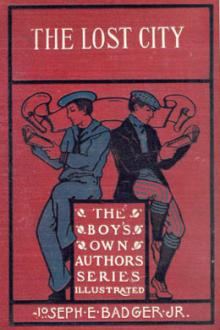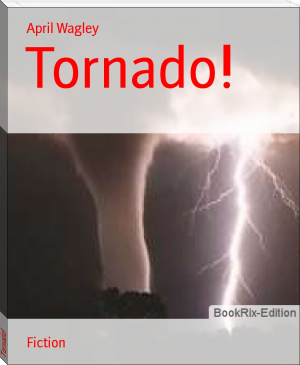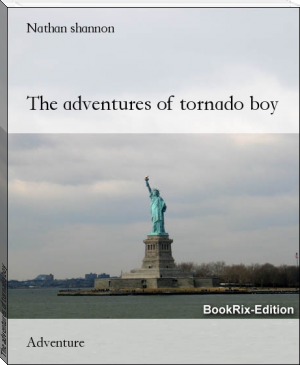The Lost City - Jr. Joseph E. Badger (children's books read aloud txt) 📗

- Author: Jr. Joseph E. Badger
- Performer: -
Book online «The Lost City - Jr. Joseph E. Badger (children's books read aloud txt) 📗». Author Jr. Joseph E. Badger
“Come with me, both of you. I am going back to the aerostat, and
I dare not leave you boys behind. Come!”
Kind of heart and generally complaisant though uncle Phaeton was,
neither Bruno nor Waldo cared to cross his will when made known
in such tones, and without further remonstrance they followed his
lead, slipping away from the snug little observatory without
drawing attention to themselves from any of yonder busy horde.
Not until the trio was fairly within the gulch did the professor
speak again, and then but a brief sentence or two.
“Give me time to weigh the matter, lads. Possibly I may agree,
but don’t try to hurry my cooler judgment, please.”
Waldo gave his brother an eager nudge at this, gestures and
grimaces being made to supply the lack of words. But when, the
better to express his confidence that all was coming their way,
the youngster attempted a caper of delight, his foot slipped from
a leaf-hidden stone, and he took an awkward tumble at full
length.
“Never touched me!” he cried, scrambling to his feet ere a hand
could come to his aid. “Who says I don’t know how to stand on
both ends at the same time?”
Barring this little caper, naught took place on their way to the
air-ship; and once there, the professor heaved a mighty sigh,
wiping his heated face as one might who has just won a worthy
race. But he betrayed no especial haste in setting the
flying-machine afloat and Waldo finally ventured:
“Can we help you off, uncle Phaeton?”
But he was assured there existed no necessity for such great
haste.
“In fact, it might be dangerous to start while so many of the
Aztecs are upon the lookout,” came the unexpected addition. “I
believe it would be vastly better not to leave here until shortly
before dawn, to-morrow.”
It took but a few words further to convince the brothers that
this idea was wisest, and while the young fellows felt sorry to
have their view cut so short, neither ventured to actually rebel.
After all, the day was well-nigh spent, and, besides preparing
their evening meal, it was essential that their plans for the
immediate future should be shaped as thoroughly as possible.
Professor Featherwit had resolved to fetch Cooper Edgecombe to
the scene of interest, in order to give him at least a fair
chance to solve the enigma which was perplexing them all. Even
so, he felt that no small degree of physical danger would attend
that presence, particularly if it should really prove, as they
could but suspect, that both wife and daughter of the involuntary
exile were yonder, among the Aztecans.
Much of this the professor made known to his nephews during that
evening, the trio thoroughly discussing the matter in all its
bearings, but before the air-ship was prepared for the night’s
rest, uncle Phaeton made the youngsters happy by consenting to
their remaining behind as guardians to the Lost City, while he
went in quest of the balloonist.
“But bear ever in mind the conditions, lads,” was his earnest
conclusion. “I place you upon your honour to take all possible
precautions against being discovered, or even running the least
unnecessary risk during my absence.”
“Don’t let that bother you, uncle Phaeton,” Waldo hastened to
give assurance. “We’ll be wise as pigeons, and cautious as any
old snake you ever caught up a tree; eh, Bruno, old man?”
“We promise all you ask, uncle, but does that mean we must stay
right here, without even stealing a weenty peep at the Lost
City?”
Professor Featherwit felt sorely tempted to say yes, but then,
knowing boyish nature (although Bruno had just passed his
majority, while Waldo was “turned seventeen”) so well, he feared
to draw the reins too tightly lest they give way entirely.
“No; I do not expect quite that much, my lads; but I do count on
your taking no unnecessary risks, and in case of discovery that
you rather trust to flight, and my finding you later on, than to
actually fighting.”
So it was decided, and at a fairly early hour the trio lay down
to sleep. Although so unusually excited by the marvellous
discoveries of the day just spent, their open-air life tended to
calm their brains, and, far sooner than might have been expected,
sleep crept over them, one and all, lasting until nearly dawn.
Perhaps it was just as well that the wakening was not more early,
for the professor was beginning to regret his weakness of the
past evening, and had there been more time for drawing lugubrious
pictures of probable mishaps, he might even yet have insisted on
taking the youngsters with him.
Knowing that it was rather more than probable some of the Indians
would be stationed upon the hills to watch for the queerly shaped
air-demon, the professor felt obliged to lose no further time,
and so the separation was effected, just as the eastern sky was
beginning to show streaks and veins of a new day.
“Touch and go!” cried Waldo, with a vast inhalation as he watched
the aeromotor sail away with the swiftness of a bird on wing.
“And for a weenty bit I reckoned ‘twas you and me as part of the
go, too!”
In company the lads enjoyed a more leisurely meal than their
relative had dared wait for, knowing that, at the very least,
they would have the whole of that day to themselves, so far as
uncle Phaeton was concerned. As a matter of course, he would not
attempt to return except under cover of night, or in the early
dawn of another day.
All that had been thoroughly discussed and provided for the
evening before, and was barely touched upon by the brothers now.
Their first and most natural thought was of yonder Lost City,
with its inhabitants, red, white, and yellow, as Waldo put it;
but being still under the foreboding fears of the professor, they
finally agreed to remain where he left them until after the sun
crossed its meridian.
It was a rather early meal which the brothers prepared, if the
whole truth must be told; and the last fragments were bolted
rather than chewed, feet keeping time with jaws, as they hastened
towards the observatory.
There was pretty much the same sort of view as on the day before,
the main difference being that many of the Indians were labouring
in the fields, instead of watching for the air-demon.
Using the glass by turns, the lads kept eager watch for the white
women whom Waldo stubbornly persisted were within the town; but
hour after hour passed without the desired reward, and Bruno
began to doubt whether there was any such vision to be won.
“The sun was in your eyes, and you let mad fancy run away with
your better judgment, boy,” he decided, at length. “If not,
why—what now?”
For Waldo gave a low, eager exclamation, gripping the field-glass
as though he would crush in the reinforced leather case. A few
moments thus, then he laughed in almost fierce glee, thrusting
the glass towards his brother, speaking excitedly:
“A crazy fool lunatic, am I? Well, now, you just take a squint
at the old house for yourself and see if—biting you, now, is
it?”
For Bruno showed even more intense interest as he caught the
right line, there taking note of—yes, they surely were white
women! Faces, hair, all went to proclaim that fact. And more
than that, even.
“Fair—lovely as a painter’s dream!” almost painfully breathed
the elder Gillespie. “I never saw such a lovely—”
“Injun squaw, of course. Couple of ‘em. Nobody but a fool would
ever think different. The idea of finding white women—”
“They are ladies, Waldo! I never saw such—and I feel that they
must be the ones lost by poor Edgecombe when that storm—”
“That’s all right enough, old fellow,” interrupted Waldo,
claiming the glass once more. “No need of your playing the
porker on legs, though, as I see. Give another fellow a chance
to squint. But aren’t they regular jo-dandies, though, for a
fact?”
The two women in question, clad in flowing robes of white, lit up
here and there by a dash of colour, were slowly pacing to and fro
upon the temple where first discovered by the keen-eyed
youngster. Thanks to the excellent glass, it was possible to view
them clearly in spite of the distance, and there could be no
dispute upon that one point: both mother and daughter (granting
that such was their relationship) were more than ordinarily fair
and comely of both face and person.
For the better part of an hour that slow promenade lasted, and
until the women finally passed beyond their range of vision, the
brothers took eager and copious notes. Then, in spite of the
fact that scores of other figures still came within their field
of vision, curiosity lagged.
“It’s like watching a street medicine show, after hearing Patti
or seeing Irving,” muttered Bruno, drawing back and stretching
his wearied limbs beyond possible discovery.
“Or the A B C class playing two-old-cat, after a league game of
extra innings; right you are, my hearty!” coincided Waldo,
feeling pretty much the same way, “only with a difference.”
Shortly after this, Bruno suggested a retreat to the rendezvous,
and for a wonder his brother agreed without amendment.
The brothers passed down to the gulch, which formed the easiest
route to their refuge, saying very little, and that in lowered
tones. The confirmation so recently won served to stir their
hearts deeply, and neither boy could as yet see a way out of the
labyrinth that discovery most assuredly opened up before them.
“Of course we can’t leave them there to drag on such a wretched
existence,” declared Bruno. “We couldn’t do that, even though we
learned they held no relationship to Mr. Edgecombe. But—how?”
“I reckon it’s—what?” abruptly spoke Waldo, gripping an arm and
stopping short for a few seconds, but then impulsively springing
onward again as wild sounds arose from no great distance.
A score of seconds later they caught sight of a huge grizzly bear
in the act of falling upon a slender stripling, whose bronze hue
as surely proclaimed one of the Aztec children from yonder Lost
City.
What was to be done? Disobey their uncle, or leave this lad to
perish?
CHAPTER XVIII.
SOMETHING LIKE A WHITE ELEPHANT.
Only a lad, slight-limbed and slenderly framed to the eye, yet
for all that gifted with a gallant heart, else he surely must
have been cowed to terror by the huge bulk of such a dire
adversary at close quarters.
Instead of trying to find safety in headlong flight, the Indian
stood at bay, with both hands firmly gripping the shaft of his
copper-bladed spear, at far too close quarters for employing bow
and arrows, while the copper knife in his sash was held in
reserve for still closer work.
Snarling, growling, displaying its great teeth while clumsily
waving enormous paws which bore talons of more than a
finger-length, the bear was balanced upon its hindquarters,
evidently just ready to lurch forward with striking paws and
gnashing teeth.
Its enormous weight would prove more than sufficient to end the
contest ere it fairly began, while a slight stroke from those
taloned paws would both slay and mutilate.
No one was better aware of all this than the Indian lad himself,
yet he took the initiative, swiftly darting his spear forward,
lending to its keen point all the power of both arms and body.





Comments (0)